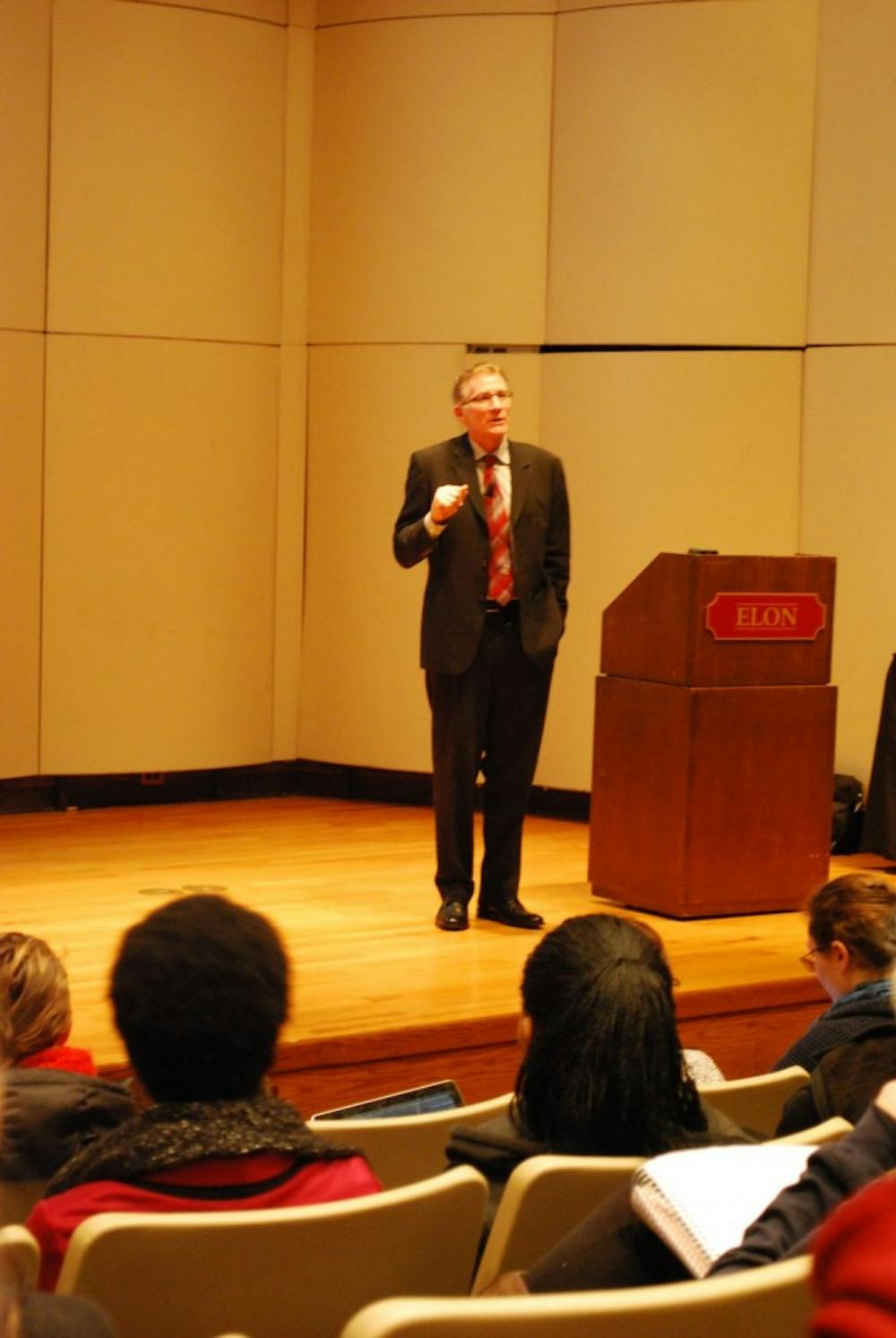Eight years and hundreds of interviews later, an award-winning journalist visited Elon University Tuesday night to share his ground-up rendering of South Africa’s story since the Nelson Mandela-led revolution ceded the spotlight.
Douglas Foster, associate professor at the Medill School of Journalism at Northwestern University, gave his audience a behind-the-scenes peek at the process of crafting his 2012 work: “After Mandela: The Struggle for Freedom in Post-Apartheid South Africa.”
The moment was right to consider themes of racism and apartheid, healing and acceptance, Foster said – one day after the federal holiday for Rev. Martin Luther King Jr., and in the midst of the half-century anniversary of the March on Washington and the yearlong South African commemoration of two decades since the fall of apartheid.
“Change longed for for generations, and only half-achieved has moved forward in bits and starts,” Foster said. “But these themes are universal.”
People the world over, especially those in the United States, would be wise to take a page out of South Africa’s still-unraveling history book, Foster said, given the architects of apartheid took major cues from visits to the American South in the 1930s and 1940s, including forays into then-segregated North Carolina.
“Part of what they designed in South Africa was an attempt to nationalize and make better the lines of segregation and racial oppression that existed in the southern United States,” he said.
But without an open dialogue built on mutual respect, these lessons are for naught, Foster said as he praised senior Lindsey Langdon, who is white, for sharing the stares she received strolling through Johannesburg, South Africa, with her black boyfriend in 2012.
“I wasn’t afraid to ask the question at all,” Langdon said. “To me, my experience is symbolic of all of these larger issues.”
Though it’s a far cry from Johannesburg, Langdon went on to say, Elon isn’t the most welcoming, either, of marginalized groups, of interracial couples.
“People like me are needed around here to shake things up a little bit,” she said. “I could fit in and belong in the stereotypical social scene around here if I wanted to, but I don’t.”
But sophomore Declan Cleary said Elon is more conscious of issues of international importance than other schools he’s visited.
"No place is perfectly accepting,” he said. “But Elon does the best job out of any school I’ve seen of facilitating these conversations, of starting to move in the right direction.
While “Whites Only” signs lingered in South Africa longer than in the United States, the nation as a whole was quicker to move toward equality under the guidance of Mandela and the African National Congress (ANC) in the early 1990s. The southernmost tip of Africa moves a little closer to true equality - racial, cultural, sexual - each day, Foster said, but it’s still very much a work in progress.
“What is it about a place and a time when a society starts to sew itself together again?” Foster asked. “It’s what keeps me alive, keeps me awake. It’s the time I’m most passionate about and proud of at the end of the day.”
Foster spent the better part of a decade in the 2000s documenting South Africa sewing itself together. The resulting massive 608-page narrative is told primarily through the eyes of the people, the ruling black elite and the whites ousted from power, from President Jacob Zuma’s daughter Thuthu to Gwendolyn Dube, a teenager living with HIV outside Johannesburg.
Naemmah Clark, associate professor of communications, praised Foster, a former editor-in-chief of Mother Jones, for continuing to write and research while teaching.
“There’s something just so exciting to me about someone who spends every day after such a long career still writing,” she said. “His work is equally impressive in terms of writing as it is research.”
As the treatment of South Africa’s marginalized improves with each passing day, Foster said, the implications for the rest of the world grow stronger. South Africa may be a living, breathing experiment of widespread social change, revolution even.
"I think that we all have something at stake here, and the success of that experiment is vital because on each of these standards in South Africa, the values radiate out to the continent and to the rest of the world,” he said. “If it fails, it’s bad not just for South Africans. It’s bad for us. What worries me most is that people like us won’t see the connection between freedom here and freedom there.”


